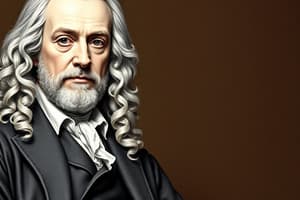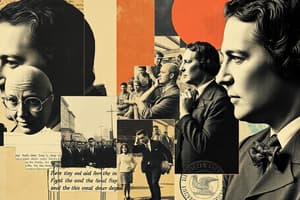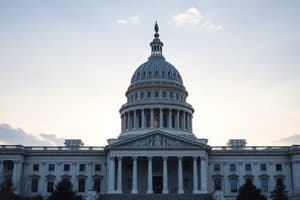Podcast
Questions and Answers
Which Enlightenment thinker emphasized the idea of a social contract, where government legitimacy comes from the consent of the governed?
Which Enlightenment thinker emphasized the idea of a social contract, where government legitimacy comes from the consent of the governed?
- Jean-Jacques Rousseau (correct)
- Baron de Montesquieu
- Voltaire
- John Locke
What is the core principle behind the concept of 'laissez-faire' economics?
What is the core principle behind the concept of 'laissez-faire' economics?
- The belief that economies function best without government interference. (correct)
- A planned economy directed by a central authority.
- A system of mercantilism with strict government control over trade.
- Government intervention in the economy to promote social welfare.
Which Enlightenment thinker argued for the separation of powers in government, with checks and balances between branches?
Which Enlightenment thinker argued for the separation of powers in government, with checks and balances between branches?
- Jean-Jacques Rousseau
- Voltaire
- John Locke
- Baron de Montesquieu (correct)
What is the meaning of the term 'tabula rasa' as used by John Locke?
What is the meaning of the term 'tabula rasa' as used by John Locke?
Which of the following best describes the concept of 'deism' as it emerged during the Enlightenment?
Which of the following best describes the concept of 'deism' as it emerged during the Enlightenment?
Which of the following was NOT a key characteristic of the Enlightenment?
Which of the following was NOT a key characteristic of the Enlightenment?
What is the core idea behind 'natural rights' as articulated by Enlightenment thinkers?
What is the core idea behind 'natural rights' as articulated by Enlightenment thinkers?
Which Enlightenment thinker is most closely associated with the concept of 'freedom of speech' and criticism of religious fanaticism?
Which Enlightenment thinker is most closely associated with the concept of 'freedom of speech' and criticism of religious fanaticism?
Which of the following BEST describes the impact of Enlightenment ideals on the American Revolution?
Which of the following BEST describes the impact of Enlightenment ideals on the American Revolution?
Which of the following was NOT a major cause of the French Revolution?
Which of the following was NOT a major cause of the French Revolution?
Which of the following accurately describes the concept of 'popular sovereignty'?
Which of the following accurately describes the concept of 'popular sovereignty'?
What was the main purpose of mercantilism in the colonial era?
What was the main purpose of mercantilism in the colonial era?
Which of the following BEST describes the social hierarchy in colonial Latin America?
Which of the following BEST describes the social hierarchy in colonial Latin America?
What was the main outcome of the American Revolution?
What was the main outcome of the American Revolution?
Which of the following events was a key turning point in the American Revolution?
Which of the following events was a key turning point in the American Revolution?
Which Enlightenment thinker emphasized the idea of a social contract between the government and its people?
Which Enlightenment thinker emphasized the idea of a social contract between the government and its people?
Which of the following is NOT a characteristic of civic nationalism?
Which of the following is NOT a characteristic of civic nationalism?
Which of the following figures is associated with liberal nationalism?
Which of the following figures is associated with liberal nationalism?
What is the key difference between liberal and conservative nationalism?
What is the key difference between liberal and conservative nationalism?
Which of the following is a core principle of conservative nationalism?
Which of the following is a core principle of conservative nationalism?
How does the concept of "Imagined Community" relate to nationalism?
How does the concept of "Imagined Community" relate to nationalism?
Which of the following events best exemplifies conservative nationalism?
Which of the following events best exemplifies conservative nationalism?
What is a distinctive feature of a nation-state?
What is a distinctive feature of a nation-state?
Which of these concepts is NOT directly linked to the rise of nationalism in the 19th century?
Which of these concepts is NOT directly linked to the rise of nationalism in the 19th century?
Which of the following figures championed a unified Italy based on the will of the people?
Which of the following figures championed a unified Italy based on the will of the people?
Which of the following terms describes the shift from an agricultural economy to one based on manufacturing and machine production?
Which of the following terms describes the shift from an agricultural economy to one based on manufacturing and machine production?
Who argued that a nation is a 'soul' based on a shared past and a desire for collective future?
Who argued that a nation is a 'soul' based on a shared past and a desire for collective future?
Which of the following figures is associated with the concept of 'Real Politik'?
Which of the following figures is associated with the concept of 'Real Politik'?
Which of the following was a direct result of the Industrial Revolutions?
Which of the following was a direct result of the Industrial Revolutions?
The Industrial Revolutions led to the rise of which social class?
The Industrial Revolutions led to the rise of which social class?
What was a key outcome of the French Revolution that influenced later revolutions, such as those in Haiti and Latin America?
What was a key outcome of the French Revolution that influenced later revolutions, such as those in Haiti and Latin America?
Which of the following individuals is NOT associated with the Latin American Revolutions?
Which of the following individuals is NOT associated with the Latin American Revolutions?
What is the main goal of the Congress of Vienna?
What is the main goal of the Congress of Vienna?
Which of the following is NOT a key idea associated with the Industrial Revolutions?
Which of the following is NOT a key idea associated with the Industrial Revolutions?
What was a key difference between the French Revolution and the Haitian Revolution?
What was a key difference between the French Revolution and the Haitian Revolution?
What did the Haitian Revolution, the French Revolution, and the Latin American Revolutions all have in common?
What did the Haitian Revolution, the French Revolution, and the Latin American Revolutions all have in common?
What was a key document of the French Revolution that articulated its core principles?
What was a key document of the French Revolution that articulated its core principles?
What was a major challenge faced by newly independent nations in Latin America following their revolutions?
What was a major challenge faced by newly independent nations in Latin America following their revolutions?
What was the significance of the Storming of the Bastille in the French Revolution?
What was the significance of the Storming of the Bastille in the French Revolution?
Which of the following was NOT a cause of the Latin American Revolutions?
Which of the following was NOT a cause of the Latin American Revolutions?
Which of the following was NOT a key innovation of the First Industrial Revolution?
Which of the following was NOT a key innovation of the First Industrial Revolution?
Which of the following was a social impact of the Second Industrial Revolution?
Which of the following was a social impact of the Second Industrial Revolution?
Which of the following was a major turning point in steel production during the Second Industrial Revolution?
Which of the following was a major turning point in steel production during the Second Industrial Revolution?
Which of the following is NOT an example of a key innovation in communication during the Second Industrial Revolution?
Which of the following is NOT an example of a key innovation in communication during the Second Industrial Revolution?
Which of the following is a primary criticism of capitalism, as argued by critics discussed in the text?
Which of the following is a primary criticism of capitalism, as argued by critics discussed in the text?
Which of the following political and economic ideologies advocates for a classless society with collective ownership of production?
Which of the following political and economic ideologies advocates for a classless society with collective ownership of production?
Which of the following is NOT a characteristic of the Industrial Revolution?
Which of the following is NOT a characteristic of the Industrial Revolution?
Which of the following best describes the primary factor that led to the Industrial Revolution's origin in Great Britain?
Which of the following best describes the primary factor that led to the Industrial Revolution's origin in Great Britain?
Flashcards
The Enlightenment
The Enlightenment
A cultural movement emphasizing reason, individualism, and human progress, challenging traditions.
Reason
Reason
The capacity for logical and analytical thought, valued in the Enlightenment.
Natural Rights
Natural Rights
Inherent rights of individuals such as life, liberty, and property, as proposed by Locke.
Social Contract
Social Contract
Signup and view all the flashcards
Separation of Powers
Separation of Powers
Signup and view all the flashcards
Deism
Deism
Signup and view all the flashcards
Tabula Rasa
Tabula Rasa
Signup and view all the flashcards
Laissez-faire
Laissez-faire
Signup and view all the flashcards
Popular Sovereignty
Popular Sovereignty
Signup and view all the flashcards
Mercantilism
Mercantilism
Signup and view all the flashcards
Peninsulares
Peninsulares
Signup and view all the flashcards
Creoles
Creoles
Signup and view all the flashcards
American Revolution
American Revolution
Signup and view all the flashcards
French Revolution
French Revolution
Signup and view all the flashcards
Realpolitik
Realpolitik
Signup and view all the flashcards
Giuseppe Mazzini
Giuseppe Mazzini
Signup and view all the flashcards
Otto von Bismarck
Otto von Bismarck
Signup and view all the flashcards
Congress of Vienna
Congress of Vienna
Signup and view all the flashcards
Industrialization
Industrialization
Signup and view all the flashcards
Urbanization
Urbanization
Signup and view all the flashcards
Proletariat
Proletariat
Signup and view all the flashcards
Interchangeable Parts
Interchangeable Parts
Signup and view all the flashcards
Nationalism
Nationalism
Signup and view all the flashcards
Nation-State
Nation-State
Signup and view all the flashcards
Civic Nationalism
Civic Nationalism
Signup and view all the flashcards
Ethnic Nationalism
Ethnic Nationalism
Signup and view all the flashcards
Imagined Community
Imagined Community
Signup and view all the flashcards
Liberal Nationalism
Liberal Nationalism
Signup and view all the flashcards
Conservative Nationalism
Conservative Nationalism
Signup and view all the flashcards
Bismarck's Unification
Bismarck's Unification
Signup and view all the flashcards
Assembly Line
Assembly Line
Signup and view all the flashcards
First Industrial Revolution
First Industrial Revolution
Signup and view all the flashcards
Textile Machinery
Textile Machinery
Signup and view all the flashcards
Bessemer Process
Bessemer Process
Signup and view all the flashcards
Socialism
Socialism
Signup and view all the flashcards
Communism
Communism
Signup and view all the flashcards
Anarchism
Anarchism
Signup and view all the flashcards
Storming of the Bastille
Storming of the Bastille
Signup and view all the flashcards
Reign of Terror
Reign of Terror
Signup and view all the flashcards
Declaration of the Rights of Man
Declaration of the Rights of Man
Signup and view all the flashcards
Haitian Revolution
Haitian Revolution
Signup and view all the flashcards
Simón Bolívar
Simón Bolívar
Signup and view all the flashcards
Causes of Latin American Revolutions
Causes of Latin American Revolutions
Signup and view all the flashcards
Constitution of 1801
Constitution of 1801
Signup and view all the flashcards
Outcomes of Revolutions
Outcomes of Revolutions
Signup and view all the flashcards
Study Notes
The Enlightenment (c. 1685-1815)
- A transformative intellectual and cultural movement emphasizing reason, individualism, and human progress.
- Challenged traditional authority and paved the way for revolutions.
- Key idea: Reason is the primary source of knowledge and guidance.
- Individualism emphasizes the worth of the individual, not groups.
- Natural rights: inherent rights include life, liberty, and property (Locke), or equality (Rousseau).
- Social contract: government legitimacy comes from the consent of the governed.
- Deism: God created the universe but does not intervene.
- Empiricism: knowledge from sensory experience.
- Tabula rasa: the human mind is a blank slate at birth.
Key Figures
- John Locke: Two Treatises of Government. Natural rights (life, liberty, property), government by consent, right to revolution if government violates rights.
- Baron de Montesquieu: The Spirit of the Laws. Separation of powers, checks and balances, importance of the rule of law.
- Voltaire: Candide. Freedom of speech, religious toleration, criticism of religious fanaticism.
- Jean-Jacques Rousseau: The Social Contract. Popular sovereignty, general will, importance of civic virtue; emphasis on equality.
- Adam Smith: The Wealth of Nations. Laissez-faire economics, free markets, the "invisible hand" of self-interest promoting good.
- Immanuel Kant: "Dare to Know!". Reason and autonomy.
- Cesare Beccaria: Argued against torture and capital punishment.
- Mary Wollstonecraft: A Vindication of the Rights of Women. Advocated for women's rights, especially access to education.
- Olympe de Gouges: Declaration of Rights of Women. Advocated for women's rights.
Atlantic Revolutions
- Enlightenment ideals (liberty, equality, popular sovereignty) fueled revolutions in the Americas and Europe.
- Popular Sovereignty: Government authority from the consent of the people, through their elected representatives.
- Natural Rights: Rights inherent from birth (life, liberty, and property).
- Social Contract: Agreement between individuals and the government, where individuals give up some rights to receive protection and order.
Key Revolutions
- American Revolution (1775-1783): British policies (taxes), Enlightenment ideals (Locke), and figures like George Washington and Thomas Jefferson. Key events: Boston Tea Party, Lexington and Concord.
- French Revolution (1789-1799): Social inequalities (Estates System), economic problems (debt, famine), and Enlightenment ideas (Rousseau). Key events: Storming of the Bastille, Reign of Terror.
- Haitian Revolution (1791-1804): Brutal slavery and desire for equality. Leaders include Toussaint Louverture and Jean-Jacques Dessalines.
- Latin American Revolutions (19th Century): Social inequalities (Peninsulares and Creoles), colonial rule, and Enlightenment ideas. Key figures: Simón Bolívar, José de San Martín.
Nationalism (Liberals vs. conservatives).
- Nationalism emerged as a powerful force in the 19th century, shaping political boundaries and leading to both unification and conflict.
- Liberal Nationalism: Popular sovereignty, individual rights, and constitutional government.
- Conservative Nationalism: Order, tradition, social hierarchy, linked to monarchy or aristocracy.
- Realpolitik: System of politics based on practical considerations rather than ideology.
- Nation-State: A state with shared national identity, culture, and history. (Civic/ethnic based)
Industrial Revolutions
- First Industrial Revolution (c. 1760-1840):
- Innovations like the steam engine, textile machinery, iron production.
- Started in Great Britain; rise of factories, urbanization, and social inequality.
- Second Industrial Revolution (c. 1870-1914):
- Innovations like electricity, internal combustion engine, and advancements in communication. Increased industrialization, and social changes beyond Britain.
Critics of Capitalism
- Exploitation of workers, growing inequality, social alienation, destructive competition, and environmental degradation.
- Socialism: Advocating for social ownership and democratic control of production.
- Communism: Classless society where the means of production are owned collectively.
- Anarchism: Abolition of the state and hierarchical authority.
- Utopianism: Ideals of creating ideal societies based on cooperation and social harmony.
- Liberalism: Individual freedom and limited intervention, often looking to gradual, non-violent change .
- Fabianism: Advocating for a peaceful transition to socialism primarily through established political means.
- Marxism : Ideas of revolution and a classless society.
Studying That Suits You
Use AI to generate personalized quizzes and flashcards to suit your learning preferences.




